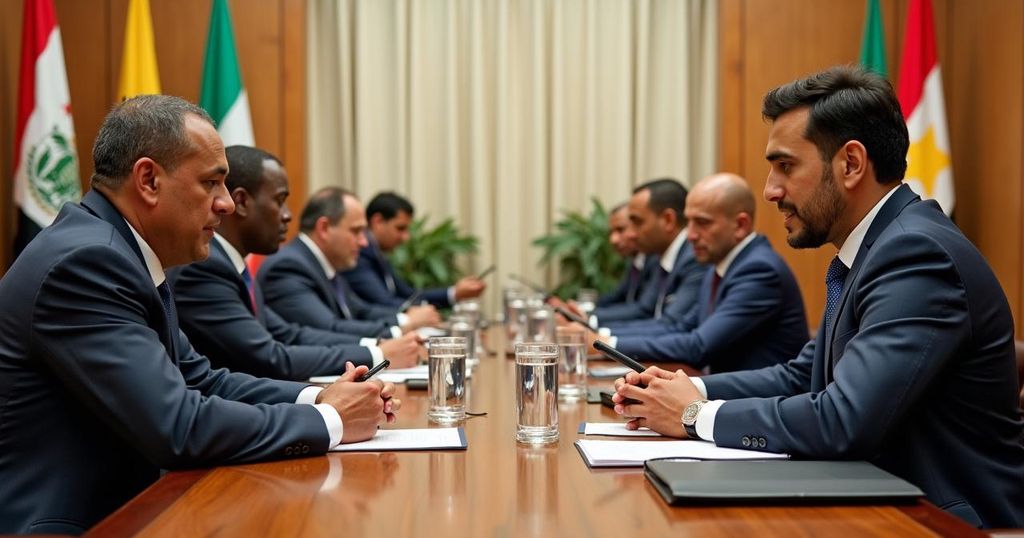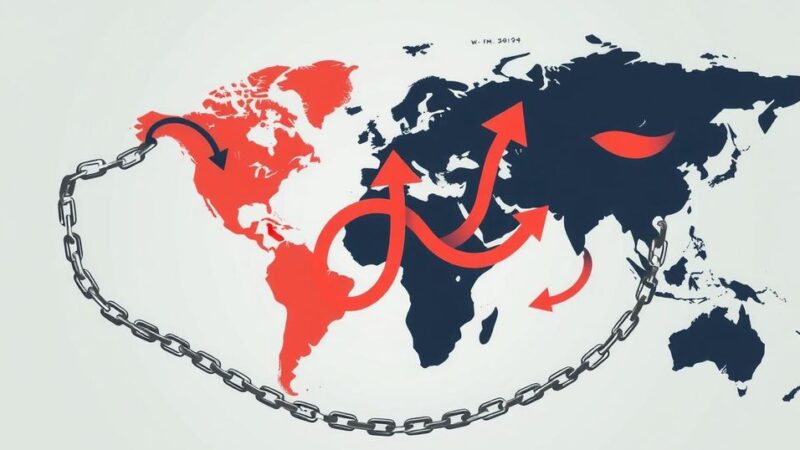Leaders from Egypt, Somalia, and Eritrea met in Asmara to strengthen their alliance amid tensions with Ethiopia, emphasizing cooperation while addressing shared security concerns. The meeting highlights ongoing geopolitical complexities, including Ethiopia’s aspirations for port access and disputes over the Nile River, amid fears of potential conflict.
Leaders from Egypt, Somalia, and Eritrea recently convened in the Eritrean capital of Asmara, reinforcing their relationships amid ongoing tensions with Ethiopia. The Eritrean government issued a statement emphasizing the importance of respecting the “sovereignty… and territorial integrity of the countries in the region,” which may imply concerns regarding Ethiopia’s aspirations for access to a seaport. Following diplomatic strains, Somalia has fortified its ties with Egypt and Eritrea, both nations with longstanding disputes against Ethiopia, raising apprehensions about the potential for conflict. Hassan Khannenje, director of the Horn International Institute for Strategic Studies, characterized the alignment as an “axis against [Ethiopian capital] Addis Ababa,” suggesting a collective effort to exert pressure on Ethiopia. However, Somalia’s Information Minister, Daud Aweis, refuted claims of hostility, asserting that the summit focused solely on cooperation, emphasizing, “Addis Ababa is our neighbour… but still we stand for peace.” A key outcome of the meeting was the agreement to enhance Somali state institutions to better handle internal and external challenges and to empower the Somali National Federal Army in its fight against terrorism. The summit marked Egyptian President Abdul Fattah al-Sisi’s first visit to Asmara and underscored the evolving relationship among the three nations, particularly in light of Egypt’s military support to Somalia, including a significant arms shipment. Historically, Ethiopia has supported the government in Mogadishu against the militant group al-Shabab; however, relationships have soured following Ethiopia’s recent preliminary agreement with Somaliland to lease coastal territory, which Somalia disputes as rightfully its own. Furthermore, Ethiopia and Egypt have been embroiled in disputes over Ethiopia’s Nile dam project, with Egypt concerned about its potential impact on its water supply. Despite hopes for improved Ethiopian-Eritrean relations following a peace declaration in 2018, tensions resurfaced after the civil war in Ethiopia’s Tigray region, in which Eritrea allied with the Ethiopian government. Prime Minister Abiy Ahmed’s stated intentions for potential port access on the Red Sea have further complicated relations in the Horn of Africa.
The recent summit in Asmara involving the leaders of Egypt, Somalia, and Eritrea occurs against a backdrop of historical tensions in the Horn of Africa. Each leader represents a nation that has divergent, often strained, relations with Ethiopia, driven by territorial disputes and resource management, particularly around the Nile River. As a landlocked country, Ethiopia’s ambitions for access to ports are seen through a lens of regional stability and economic necessity. The prior thawing of relations between Ethiopia and Eritrea following the 2018 peace agreement had raised hopes for cooperation but has since deteriorated due to a variety of conflicts and disagreements. Egypt’s concerns over the Nile dam highlight significant geopolitical stakes in the region, making the recent trilateral cooperation particularly crucial in the current context.
The meeting in Asmara among the leaders of Egypt, Somalia, and Eritrea signifies a strategic alignment against Ethiopia amid escalating regional tensions. While some officials assert that the summit was intended only for cooperative purposes, the historical context and prevailing disputes suggest a more complex dynamic at play. As the Horn of Africa continues to navigate its geopolitical landscape, the ramifications of this newly articulated alliance cannot be underestimated, particularly in light of ongoing conflicts and national interests. These developments warrant careful observation as they may influence the trajectory of regional relations in the coming years.
Original Source: www.capitalfm.co.ke







